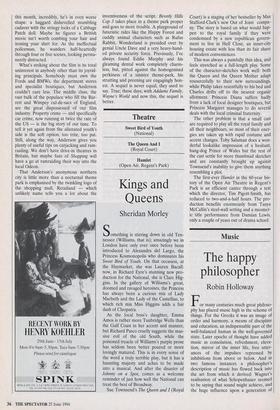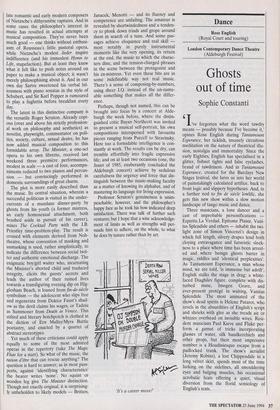Music
The happy philosopher
Robin Holloway
For many centuries much great philoso- phy has placed music high in the scheme of things. For the Greeks it was an image of order and harmony, a means of discipline and education, an indispensable part of the well-balanced human in the well-governed state. Later epochs of thought have added music as consolation, refreshment, eleva- tion, mirror of the inner life, free utter- ances of the impulses repressed by inhibitions from above or below. And in two famous instances a philosopher's description of music has flowed back into the art from which it derived: Wagner's realisation of what Schopenhauer seemed to be saying that sound might achieve, and the huge influence upon a generation of late romantic and early modern composers of Nietzsche's dithyrambic raptures. And in some cases the philosopher's interest in music has resulted in actual attempts at musical composition. They've never been much good — one thinks without enthusi- asm of Rousseau's little pastoral opera, while Nietzsche's modest lieder inspire indifference (and his immodest Hymn to Life, stupefaction). But at least they knew what it felt like to push notes around on paper to make a musical object; it wasn't merely philosophising about it. And in our own day Sartre sweetened his verbal bil- iousness with piano sonatas in the style of Schubert, and Sir Karl Popper is rumoured to play a fughetta before breakfast every day.
The latest in this distinctive company is the versatile Roger Scruton. Already copi- ous (over and above his strictly profession- al work on philosophy and aesthetics) as novelist, playwright, commentator on poli- tics, society, culture, sexual desire, he has now added musical composition to this formidable array. The Minister, a one-act opera to his own libretto, received last weekend three premiere performances, modest in scale — a cast of four, accompa- niments reduced to two pianos and percus- sion — but convincingly performed in domestic surroundings of great charm.
The plot is more easily described than the music. Its central situation, wherein a successful politician is visited in the under- currents of a mundane dinner-party by ghosts from his youth (a former mistress, an early homosexual attachment, both brushed aside in pursuit of his career), mixes The Cocktail Party with the J.B. Priestley time-problem-play. The result is crossed with elements derived from Noh- theatre, whose convention of masking and unmasking is used, rather simplistically, to indicate the difference between social twit- ter and authentic emotional discharge. The enigmatic boy/girl waiter who, incarnating the Minister's aborted child and traduced integrity, elicits the guests' secrets and leads the author of their ruined lives towards a transfiguring evening dip on Hig- glesham Beach, is loaned from fin-de-siecle symbolism — the adolescent who slips free and regenerate from Doktor Faust's shad- ow as the devil claims his wages, or Tadziu as Summoner from Death in Venice. This stilted and literary hotchpotch is clothed in the diction of Ern Malley/Myra Buttle poetastry, and enacted by a quartet of abstract stereotypes. Yet much of these criticisms could apply equally to some of the most admired operas in the repertory (take The Magic Flute for a start). So what of the music, the raison d'être that can rescue anything? The question is hard to answer; as in most pass- ports, against 'identifying characteristics' the bearer writes 'none'. No squint or wooden leg give The Minister distinction. Though not exactly original, it is surprising- ly unbeholden to likely models — Britten,
Janacek, Menotti — and its fluency and competence are unfailing. The amateur is revealed by shortwindedness and a tenden- cy to plonk down triads and grope around them in search of a tune. And some pas- sages achieve eloquence and real skill most notably in purely instrumental moments like the very opening, its return at the end, the music to which the charac- ters dine, and the tension-charged phrases in the scene between the protagonist and his ex-mistress. Yet even these bits are in some indefinable way not real music. There's a sense of composing-by-numbers, using sheer I.Q. instead of the unname- able something that makes all the differ- ence.
Perhaps, though not named, this can be brought into focus by a concert at Alde- burgh the week before, where the distin- guished critic Bayan Northcott was invited to present a musical self-portrait, his own compositions interspersed with favourite pieces ranging from Purcell to Stravinsky. Here too a formidable intelligence is con- stantly at work. The results can be dry, can tremble effortfully into fragile expressive life; and on at least two occasions (one, the Sextet of 1985, exuberantly concluded the Aldeburgh concert) achieve by sedulous carefulness the urgency and force that dis- tinguish between the music-making faculty as a matter of knowing its alphabet, and of mastering its language for living expression.
Professor Scruton's genuineness is unim- peachable, however, and the philosopher's happy face as he took his bow indicated deep satisfaction. There was talk of further such ventures; but I hope that a wise acknowledge- ment of limits as well as strengths will per- suade him to adhere, on the whole, to what he does by nature rather than by art.
'It's a career move!'

































































 Previous page
Previous page